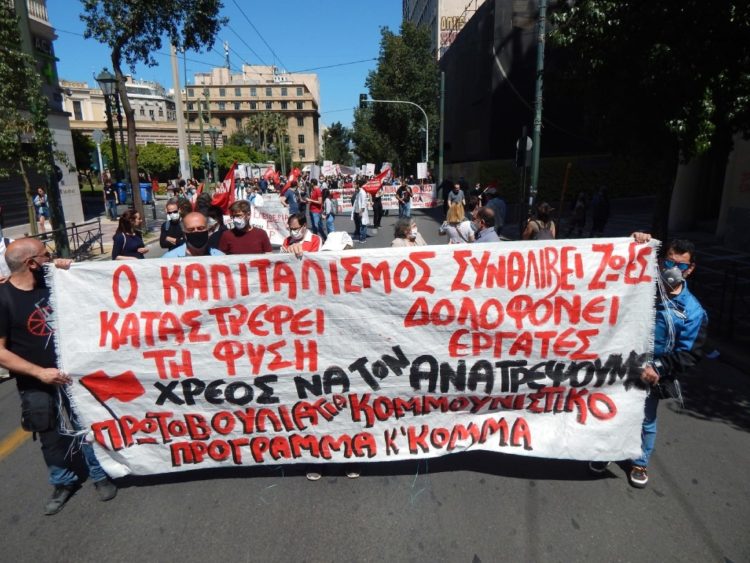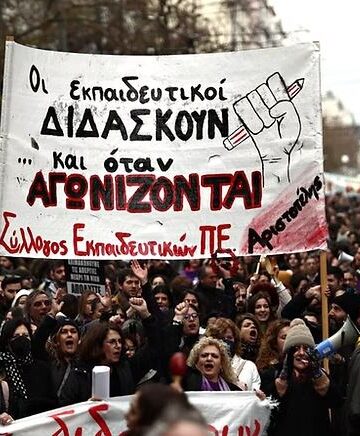Initiative for a New Communist Organization and Program
The capitalist world today
The explosive contradictions of Total Capitalism
Capitalism is threatening the perspective of humanity
Every aspect of modern reality highlights the incompatibility of modern total capitalism with the needs of the social majority and its potential to lead a life worthy to be lived, in a context of true freedom.
– The gap between rich and poor is widening. During the two years of the pandemic alone, the 10 richest people in the world more than doubled their fortunes, from 700 billion to 1.5 trillion dollars, while 99% of humanity saw their income decline and 160 million people fell below the poverty line. Overall, the richest 1% of the planet now owns 50% of the world’s wealth, while the poorest 50% of the world owns just 0.75%.
– The satisfaction of social needs is sacrificed on the altar of capital profitability.
-The value of human life is reduced to a mere statistic. In martyred Gaza, in Ukraine and elsewhere, thousands of people are losing their lives, millions are becoming refugees, entire societies are being stripped of infrastructure and life. The thousands of human lives lost in the Aegean and the Mediterranean are only part of the overall horror of war and geopolitical capitalist antagonisms. Employer murders of their workers, conveniently called “accidents” and deaths from a lack of basic health infrastructure, food and water complete the grim picture.
– Living in harmony with nature is becoming a distant dream, with ecological destruction gradually threatening our conditions of existence on Earth.
– The global explosion of the food overproduction-hunger and malnutrition contradiction. Today, world food production is more than double the nutritional needs (7,000 calories per capita each day instead of 3,000). At the same time, 11 people die of hunger every minute, i.e. 16,000 people every day, mostly children!
– At a time when humanity has the potential to live with unprecedented liberties -free even from wage slavery- and to determine its own future, the democracy of the bourgeois is showing its true face, as a dictatorship of the bourgeoisie. Throughout the capitalist world we are witnessing an attack on popular liberties, which is also reflected in the rise of the far right and the extreme reactionary agenda of the bourgeois parties.
– The alienation of the worker from the products of human labour, from nature, from fellow workers, leads to an intensification of individualism and social cannibalism. It leads to the acceptance of a fragmented, chaotic and competitive world between separate individualisms. Bourgeois culture cultivates, produces and reproduces barbarism and manipulation.
It is important to connect all the above images into one. The system’s apologists use a multitude of euphemisms for these phenomena and -above all- try to portray them as random and isolated events. The savage exploitation of workersis presented under the technocratic term ‘inequalities’, to which everyone is sensitised. The destructive effects of capitalism on the environment are dubbed with the class-neutral term ‘climate crisis’. The inability of state social structures to respond to basic situations is dubbed ‘administrative incompetence’, as if responsibility does not lie in the “minimum state” doctrine followed by all the governments of previous years. As for the consequences of the discrimination inherent in exploitative societies on the basis of gender, race, religion or sexual orientation, these are attributed to deviations from the path of ‘political correctness’ or to attitudes and practices that come only from the past of societies. And yet, every such phenomenon that bourgeois politics seeks to present as an “especial” or ‘unexpected’ aspect that disrupts ‘normality’ is in fact nothing other than an unresolved contradiction and a separate manifestation of modern Total Capitalism’s universal crisis.
Today’s capitalism: Superior exploitation at its core
Capitalism is constantly changing, sometimes through major breakthroughs, but always to remain tragically the same in its basic exploitative-oppressive essence. This is precisely why the “heart” of the new stage of TotalCapitalism is the qualitatively superior exploitation of workers. Modern capitalism combines the extraction of absolute surplus value with the extraction of relative surplus value organically and in a historically original way; in-production (direct) with out-of-production (indirect) exploitation, pushing billions of people below the survival threshold and sharply increasing unemployment, precarious and flexible labour.
In its new stage of development, Total Capitalism commodifies all sectors of social life and the relationship between man and nature in its entirety. It fully commodifies natural resources, the reproduction of labour power, familial or communal structures and relations, interpersonal relations, communication, personal data and other aspects.
Modern capitalism generalizes its fields of intervention by turning whatever piece of public wealth, public space and common goods that can be exploited to produce profit and appropriate foreign, unpaid labour into private property. At the same time, the growth of private household debts, together with the explosion of public debt of states, form an accelerating process of concentration of private property that give contemporary capitalism elements of a ‘modern’ autocracy of wealth, with ownership even over the future and over nature itself.
Capital is reconstructing its “forces” through the strengthening of bourgeois states and with multinational, political-military and economic organizations (NATO, EU, WTO, IMF, etc.). At the same time, Transnational Multi-Industry Monopolies, with capital and power many times that of many states, are becoming the leading force of capitalism.
Modern capitalism is changing its technological base. With the promotion of the “digital” and “green revolution” and overall, with the technologies promoted on the basis of the so-called 4th industrial revolution (robotics, artificial intelligence, genetic engineering, bioinformatics). The new forms of energy production and storage that are being promoted are changing the form of social relations and the basis for the constitution of the modern working class, even if they are still incomplete trends.
The overdevelopment of capital, its concentration and centralization enable it to take over more and more sectors of production that have a social direction (energy, water, healthcare, research, etc). As a result, the state is transformed into a reactionary “state-headquarter”. In other words, a state whose main purpose is to regulate relations between the forces of capital and to withdraw from production and social protection.
The current strong tendency to “reintroduce the state” is not in the sense of reactivating it in production (although in some exceptional cases this is also the case), but mainly a new expansionary policy of supporting the profitability of enterprises so they can recover their profit rate and return to the “market”. The bourgeois state in each country is being ‘trimmed’ and transformed both by the forces of capital and by transnational integrations (e.g. the EU) which are taking more and more control over the ‘framework’ within which nation states and governments operate.
In this context, international relations are also being reshaped. Market competition has the projection of political-military power as its “natural” analogue, it has war on the daily agenda, while the war industry is one of its main pillars, along with the booming industries of cyber warfare, digital surveillance and all kinds of “security” services. The violent escalation of the threat of war and the involvement in the wars of NATO and capital is an explicit expression of how international relations are being reshaped based on the intensification of capitalist antagonisms. Indeed, with the lack of a rival awe, a revolutionary promise and threat, all the inter-bourgeoise /inter-imperialist conflicts for hegemony over the planet are intensifying to an extremely dangerous degree, leading the world to destruction!
The climate crisis and environmental catastrophe in general are a profound class issue, linked to the core of capitalist relations. The so-called «Green Transition», apart from shaping yet another field of capitalist activity and profitability, is proving to be a fiasco. On one hand, fossil fuel companies have a leading position in the environment’s “rescue”! On the other hand, 2.5% of the $15 trillion support packets from the 50 largest economies are directed to the so-called ‘Green Transition’, often with fossil fuel energy giants as contractors. Of course, necessary criteria are the creation of a new field of profitability and not, as it is falsely called, a ‘new energy model’.
Our overall assessment dictates that contemporary Total Capitalism constitutes a reactionary qualitative leap, a hyper-reaction “across the front line” of contradictions – values – rights – liberties. Today we are experiencing the deep generalized reconstruction of Total Capitalism, which constitutes the newest stage of reactionary development and crisis of the capitalist system. It threatens the working class, man and planet earth itself “with destruction”. This assessment of our times determines the strategy and tactics of the movement that will stand against the barbarity and murderous onslaught of Total Capitalism: With the workers’ anti-capitalist revolution and authority to achieve the communist liberation. Our assessment also determines the present phase’s political objective of immediate revolutionary struggle: resistance, shock, frustration and abrogation of individual measures and the overthrow in total of the anti-working class onslaught and all the bourgeois governments that promote it. For the reconstruction of workers’ politics in its overall confrontation with bourgeois politics based on its own programme of power and its own “political arsenal”. Independent from political choices that pave the way to reformism and any “democratic pole” at home, as well as independent from any new capitalist centre -not only the Euro-Atlantic one- in the international capitalist matrix.
Modern capitalism at a turning point
It can be said that the system overcame the global crisis of 2008 in a weak and uncertain way. But economic crises are not random or unforeseen events. They are born out of the irrationality and contradictions of the capitalist system itself. In such combustible terrain, anything can work as a spark: the bursting of the mortgage bubble as in 2008, the existence of a pandemic or even the sudden shortage of a raw material. However, the initial spark is not the cause of the crisis. The core always lies in the capitalist mode of production itself, and the essence lies in capitalism’s inability to maintain its twin pillars unhindered: the profitability of capital (economic) and bourgeois rule (political).
Today we can say for certain that the capitalist world has entered a critical turning point, which is also the starting point for a series of trends and developments at all levels. Four factors determine this turning point: 1) The first one is economic and has to do with the toils of capitalist profitability. Growth rates are relatively limited (performance in 2023: world economy 2.9% mainly due to China and India, EU 0.8%, USA 2.6%). The planetary debt is more than three times the world GDP, while maintaining the doctrine of balanced budgets seems difficult even in Germany. 2) The second factor concerns the rise of multiform capitalist-imperialist rivalries (which always become more intense when the profit margin is not significant) both within countries, between different sections of capital, and internationally, with geopolitical rivalries gaining in importance. This exacerbation is reflected in the rapidly growing challenge to the economic hegemony of the capitalist West (USA, EU, etc.) by a heterogeneous pole of states and economies (China, Russia, India, BRICS, etc.). The emergence of a period in which military confrontations are coming to the fore, when even the possibility of a nuclear confrontation cannot be ruled out is an expression of the rivalries mentioned above. 3) The third factor is related to the sharpness with which certain internal contradictions of the contemporary bourgeois order are projected, where every “response” to one aspect exacerbates others such as, for example, policies on refugees and labour shortages, the energy problem and the environmental crisis, internationalisation and supply chains, etc. 4) The fourth factor is ideological-political and relates to the limitation of the range of influence and the shaking of key ideological and political constants of the bourgeoisie. A shock that gives new possibilities to the -reconstituted- values/ideas of social emancipation and to communist answers in their captivation of the minds and action of millions of workers and young people around the world.


















